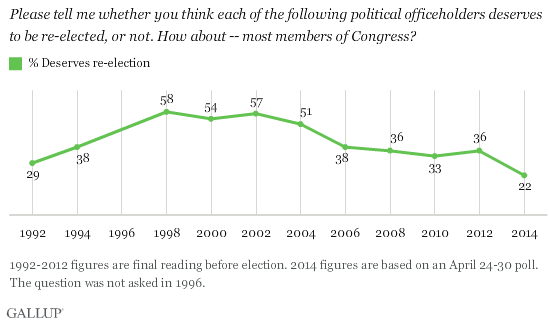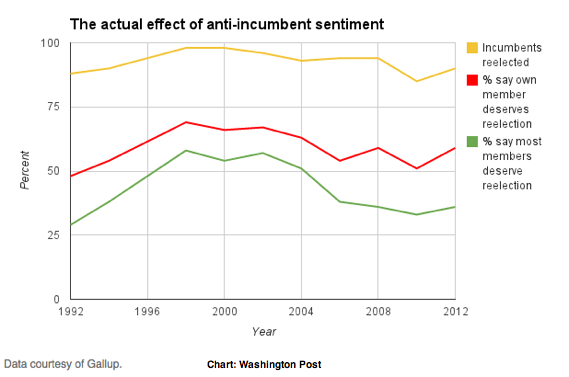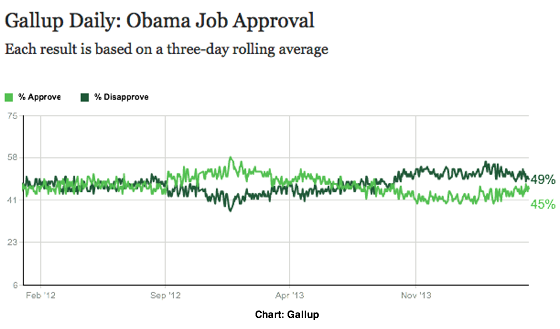
Americans don't like Congress, but most incumbents will probably survive. President Obama's approval rating shows signs of improvement. And, yes, we're talking about turnout. Again. This is HuffPollster for Wednesday, May 14, 2014.
ANTI-INCUMBENT SENTIMENT IS HIGH - Jeffrey M. Jones: "With six months to go before the midterms, 22% of U.S. registered voters say most members of Congress deserve re-election, and 72% say they do not. The 'deserve re-election' figure is on pace to be the lowest Gallup has measured in an election year….U.S. voters as a whole are more positive about their own member of Congress than about most members of Congress, as they have been since Gallup first asked these items in 1992. Currently, 50% of voters say their own member deserves re-election. This, too, is slightly more positive than in January (46%), but is similar to levels observed at the time of the elections in 1992, 1994, 2006, and 2010. Most of these years saw relatively high turnover in Congress." [Gallup]
Does it matter? - Aaron Blake: "Clearly, Americans aren't happy with the people running this country, and they appear more prepared than ever to throw the bums out and elect a wholly new Congress. Right? Well, not so much. In fact, whenever political watchers like The Fix note such polls, the boo birds are quick to remind us that, in the vast majority of election years, more than 90 percent of incumbent lawmakers are reelected. This is indisputably true. But while anti-incumbent sentiment doesn't mean Americans are suddenly going to replace entire swaths of Congress, it does matter...Three of the most anti-incumbent years on record (1992, 1994 and 2010) also produced the lowest incumbent reelection rate -- albeit still between 85 and 90 percent in each case….But the focus on anti-incumbent sentiment also kind of misses the point. That's because Americans basically never toss out a bunch of members of both parties. It's almost always one side or the other." [WashPost]
GALLUP TRACKS SLIGHT RISE IN OBAMA APPROVAL - Today's release of the Gallup Daily puts President Obama's job rating at 45 percent approve, 49 percent disapprove. HuffPollster is reluctant to make much of the daily twitches in Gallup's rating, which often moves as much as 2 to 3 percentage points in a single day (seemingly) by chance alone. After seeming stuck between 40 and 42 percent between November and late February, Gallup's more stable weekly averages have shown a modest but clear rise to 43 percent in March, 44 percent for much of April and 45 percent this past week. [Gallup Daily and weekly averages]
Same trend in Pollster chart - Not surprisingly, the Pollster chart of Obama job approval -- which includes Gallup and all other publicly available national polls -- shows the same trend. [Pollster chart]
Why it might matter for 2014 - Sean Trende, writing last November: "[P]residential job approval is still the most important variable for how his party fares in midterm elections, explaining about half of the variance. The relationship is highly statistically significant: For every point in job approval the president loses, his party loses 0.6 percent of its caucus." [RCP]
Still a tough environment - Glen Bolger (R): "Further evidence of a sour political environment is that just 31% say the country is going in the right direction, while 61% say things in the country are pretty seriously off on the wrong track. The mood of the country continues to set records for longest streak of pessimism since the Watergate/Carter malaise era – 124 consecutive months in which wrong track has been higher than right direction. The last time more voters said right direction was January 2004." [POS]
WHY FOCUSING ON TURNOUT MAY NOT BE ENOUGH FOR DEMOCRATS - Mark Mellman (D): "[W]hile mobilization remains vitally important, putting all of one’s chips on that number would mean certain defeat for Democrats. In competitive states and districts there just aren’t enough Democrats." Mellman reviews a series of academic research on get-out-the-vote efforts: "Professor Seth Masket estimated the Obama campaign’s turnout efforts added 0.6 points to his margin in 2008 and 0.3 points in 2012. Another scholar, Seth Hill, using a different empirical strategy, calculated that turnout efforts in Florida increased the 2008 Democratic vote by 0.8 points, close to Masket’s estimate. I’ve done campaigns where less than 0.8 of a point, or the equivalent of a 1.7- or 2.5 percentage point increase in turnout, determined the outcome, so you’ll never catch me denigrating the importance of turning out voters, even as the science indicates its impact is quite limited. But even if the impact of GOTV is limited, the real question for campaigns is how does its effect compare to persuasion?" [The Hill]
WANT TO JOIN THE HUFFPOLLSTER TEAM? - We're looking for a full-time, paid intern this summer to help us cover the 2014 election. Apply here]
HUFFPOLLSTER VIA EMAIL! - You can receive this daily update every weekday via email! Just click here, enter your email address, and and click "sign up." That's all there is to it (and you can unsubscribe anytime).
WEDNESDAY'S 'OUTLIERS' - Links to the best of news at the intersection of polling, politics and political data:
-Tom Wolf continues to lead the Democratic primary for Pennsylvania governor. [Franklin and Marshall College]
-Ohio Gov. John Kasich (R) takes 50 percent against a Democratic challenger. [Quinnipiac]
-A new SurveyUSA poll finds Charlie Crist 3 points ahead of Rick Scott. [WFLA]
-Americans seem to have forgiven Bill Clinton, but most (48 percent) still give Monica Lewinsky an unfavorable rating. [YouGov]
-In close Senate races, Harry Enten argues, incumbency may turn a losing candidate into a winner. [538]
-FDU researchers find that highly qualified U.S. House candidates tend to outperform the generic ballot, while less qualified candidates tend to underperform the generic ballot.
-An Anti-Defamation League survey probes anti-Semitism around the world. [ADL]
-Republicans are more divided on the issues than Democrats. [NYT]
-David Frum (R) predicts Republicans will lose their advantage among older voters. [Atlantic]
-Rhodes Cook notes no incumbents have yet lost a primary. [WSJ]
-Josh Gerstein and Stephanie Simon review the use of big data in the private sector. [Politico]
-The Census Bureau's website gets a redesign. [Fedscoop]


